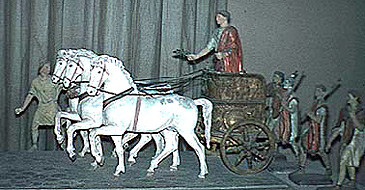

Juvenal compares the elaborate procession (pompa) during the Megalesian games to that of a triumphal parade, the greatest honor decreed by the Senate for a victorious general (imperator). By Juvenal's time, triumphs were reserved for members of the imperial family, but the praetor who presided over the Megalesian games rode in a triumphal chariot and dressed in the triumphal costume, a purple toga embroidered in gold (toga picta). Juvenal uses this analogy to a triumph to mock the games. Instead of a true imperator who brings to Rome the glory of prisoners, booty, and spoils (praeda), this elaborately dressed praetor is himself “the booty of the nags,” a captive, like the audience, of the Roman passion for chariot racing and betting.